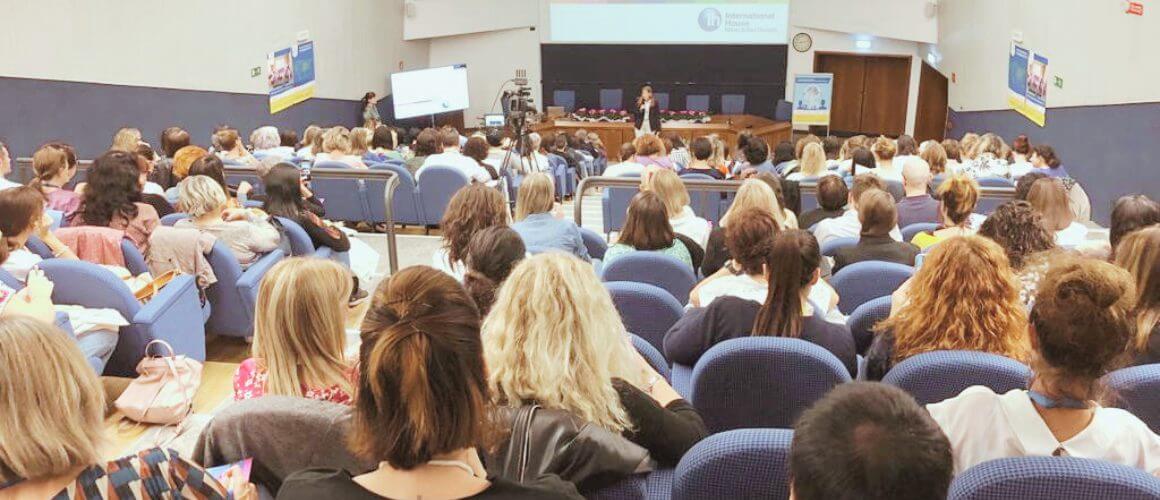Daniel Tse discusses the complex and fascinating topics of synchronous and asynchronous learning
The workshop was very helpful and gave me a lot of ideas for new ways to practice these features with my students.
At the beginning of each school year, we at International House Milan organize a conference dedicated to the teaching of English for teachers from public and private schools of all levels. The 2024 conference, entitled “Innovating for the Future: Exploring the Evolving Roles of ELT Educators”, will take place on Friday 18 October at the FAST Congress Center in Piazzale Rodolfo Morandi, 2 in Milan.
Our conference is a must-see opportunity to stay up to date on the latest trends in the EFL world, listen to renowned international speakers and network with colleagues.
Participation is free while places last.

All participants received a certificate of attendance. International House is a member of AISLI (Associazione Italiana Scuola di Lingue), Accredited Body for the training of School Teaching Staff (Decree 177/2000 and Directive 90/2003 of the Ministry of Public Education). Participation is free, reservations required subject to availability. This year, state school teachers, in addition to the mandatory registration on Eventbrite to reserve their place, could also register for the conference on the SOFIA platform so as to be able to download the certificate of attendance directly from the platform.
Participation is free, reservations required subject to availability.
As every year our conference will be attended by leading names from the EFL world.
The list of 2024 speakers is continuously updated. Open the tabs below to find out the topic of their presentations.
Developing soft skills in the ELT classroom
Nowadays, we have become so much more than mere language teachers. We have been entrusted with the privilege of preparing our students to become the future citizens of tomorrow. This implies teaching them life skills like self-knowledge, organisational, effective time management and teamwork skills. In this session, we will be taking a look at how we can tweak the coursebook to take learning English to the next level by teaching life and soft skills and engaging students to become the active citizens of tomorrow. Come along for a few good practical ideas to take into your classroom.

Vanessa Reis has been a passionate EFL teacher for the past 28 years and counting. She has taught English language learners from the ages of 3 to 60+. She currently teaches at Escola Superior de Educação in Porto, Portugal, where she teaches English language, literature and various subjects related to the methodology & didactics of teaching English. Vanessa divides her time between writing coursebooks, giving teacher training sessions around the world, teaching English and completing her Doctorate degree in the field of coursebook design, which is one of her many interests.
Release the pressure: Taking the tension out of our teenage classes
Anything and everything you do in a teens’ class will either add to or take away from the existing tension in the room. In this session I shall talk about how some of our default teaching techniques might add an unnecessary element of strain and I shall draw on ideas I have fielded over the last two decades to offer small tweaks and alternatives. There will be examples, anecdotes and photos from my own classes. Suitable for new and experience teachers alike.

Chris Roland is a trainer and methodology writer based in Seville. He has taught in the private language academy sector, mainstream schools and held posts with the British Council in Damascus and Barcelona. He is known on the international ELT conference circuit for his lively but practical talks on classroom techniques. He tutors on both Trinity Diploma and Cambridge DELTA courses. He has published a number of books through Pavilion including: Understanding Teenagers in the ELT Classroom (2018) and Structuring Fun for Young Learners (2020) with two more complementary titles to help teachers transition to online teaching. Chris’ current interests are: the dialogue between teachers and students, ways to reduce tension in the classroom and the lesson as an event in itself.
Reflections on educational technology in language classrooms
The world of ELT stands at yet another crossroads where teaching and learning are being transformed by new technologies. How can teachers harness the power of educational technology (EdTech) in planning and teaching? In search of answers, I shall reflect on my personal experiences of using digital games, artificial intelligence (AI), and virtual reality (VR) in the classroom. We shall explore three broad principles behind incorporating technology and consider the implications of this for language learners.

Daniel went into ELT in 2019 and started teaching at IH Milan the same year. He works with Young Learners, teens, and adults across the full range of CEFR language levels. He views language as something which exists everywhere around us and lays great emphasis on developing learners’ communicative competence in his teaching. Prior to ELT, Daniel trained as a classical musician and delivered outreach workshops for a number of major performing arts in the UK.
We sincerely thank the sponsors who make our conference possible every year.
We present to you the main innovation of this school year regarding teacher training: the seminars of the “Saturday Workshops for Teachers” programme. Given the great participation in last year’s workshops, we have organized a series of workshops dedicated to the teaching of English which will be held on Saturday morning at International House Milano in Viale Brenta 27 (M3 Brenta).
We have now reached the third edition of Training for Excellence, the innovative training program for state school teachers, private school teachers and freelancers, developed by AISLi (Italian Association of Language Schools) and recognized by the Ministry of Education. Training for Excellence includes 10 interactive seminars held by internationally renowned experts, the seminars will address new ideas and educational insights on relevant, original and cutting-edge topics.
By subscribing to the program you will have access to the Online Community, within which you will be able to deepen topics and content covered in seminars, share learning and teaching experiences, refine, develop, and acquire theoretical knowledge and professional skills after the course training carried out.
Each seminar will be recorded and can be used by each participant for their own classes, as an additional in-house training resource, or for individual professional development.
The 2022-2023 Training for Excellence program will begin with a free and open seminar, presented by Sarah Mercer, Professor of Foreign Language Teaching and Head of the ELT Methodology Department at the University of Graz, Austria, and will close with a interesting speech on multilingualism, by some members of the TFE team, and by the former INDIRE President prof. Giovanni Biondi. The complete program follows.
Participation includes the possibility of receiving a certificate recognized by the MIUR issued at the end of the course, having participated in at least 75% of the meetings total hours. The initiative is also present within the SOFIA platform with ID 84074.
The cost is €247 payable by Carta del Docente or credit card.
Registration open. An English level of at least B1 is required to participate.
The workshop was very helpful and gave me a lot of ideas for new ways to practice these features with my students.
Thank you again for the training session on Friday. I really enjoyed it and am going to try out some of the activities tomorrow!
The refresher courses for teachers are organised each year with focus on different themes.
In general, the sessions aim to improve knowledge of the English language certifications, a theme which is naturally highly valued by teachers of this language. The occasion is also ideal for developing practical ideas and strategies along with the teachers to develop the students’ abilities in every skill (listening, reading, writing and speaking), and to illustrate in detail the assessment criteria of the exams and understand how to guide students to achieve the best possible score in each area of the test.
The course generally consists of two 90 minute sessions, with a 30 minute break to socialise and share ideas with colleagues. The workshops are held in English so participants should have a level of English of B1 or above.
But there is more than just the Workshop Week: International House Milan organises seminars and workshops during the year. These training sessions are aimed mainly at English language teachers and take place both in Milan and throughout Lombardy.
Instead, if the teacher’s needs are more specific, ourad hoc training courses are the ideal solution: just contact International House Milan and ask for advice on more effective ways of keeping up-to-date.
Indeed, International House Milan has a team of expert trainers specialised in teacher training who hold courses and give presentations at conferences, including international ones. We will ensure that training is enjoyable, interactive and fully focussed on the participants’ specific needs.
All you have to do is send the form to the Teacher Training Department of International House Milan: a consultant will get back to you to help you plan a training path.